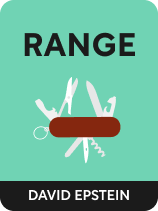

This article is an excerpt from the Shortform book guide to "Range" by David J. Epstein. Shortform has the world's best summaries and analyses of books you should be reading.
Like this article? Sign up for a free trial here .
Why is it better to focus on short-term objectives rather than planning for the long term? Should you always have an end goal in mind when pursuing something?
David Epstein, the author of Range, explains that it’s better to chase your current opportunities and passions than trying to create a long-term plan. There are three major reasons for this: you will change, you can’t predict the future, and you can’t know if a certain job would even fit you well.
Here’s why you should shift your focus to your short-term objectives.
Plan in the Short Term, Not the Long Term
Contrary to accepted wisdom, Epstein argues that it’s better to chase whatever opportunities you’re passionate about in the short term than to commit to a single long-term goal or vision for your future. This is true for a number of reasons and is rooted in the fact that the world is impossible to predict.
Reason #1: You Will Change
Firstly, people change, and it’s impossible for you to know how much you’ll change. A job that was a good fit for you ten years ago may not be anymore, and you’ll need to pivot.
Studies show that people vastly underestimate how much they’re likely to change over the next several years—a phenomenon known as the “end-of-history-illusion”—so they often overcommit to plans they make at a young age. Epstein states that our personalities change the most between the ages of 18 and 30, yet this is when many people decide what they’re going to do for the rest of their lives.
If you realize that the life you’ve planned for yourself doesn’t fit you anymore, it’s time to pivot.
| Why We Don’t Think We’ll Change Studies have shown that people will consistently underestimate how much they will change in the next ten years, even after reflecting on how much they’ve changed in the last ten years. This effect has been shown to last even among subjects in their 60s. The psychologists behind the original 2013 end-of-history illusion study have offered a couple of theories to explain this phenomenon. The first is that we do it because it feels good—believing that you won’t change much is, in a subtle way, deeply comforting. The terrifying alternative is that the goals you’re working toward and sacrificing for may eventually seem pointless, or you may change your mind completely about the person you decided to marry. Alternatively, we may assume that we won’t change just to conserve mental energy—it would be exhausting to try and predict your future self every time you make a decision. |
Reason #2: You Can’t Predict Future Opportunities
Epstein argues that it’s impossible to predict what opportunities will or won’t be available in the future. Many of today’s jobs didn’t exist ten years ago. The people who get them don’t need to specifically aim for them—they just build up skills and pivot when the time feels right. Planning your career years in advance is like drawing a map for a city that hasn’t been built yet.
Epstein cites a Harvard study of nonlinear career paths known as the Dark Horse Project. The researchers assumed that they would struggle to find successful professionals with meandering careers, but, interestingly, 90% of their first 50 subjects acknowledged that their journeys were unusually indirect. They found that these professionals shared a propensity for short-term objective planning, passionately pursuing whatever seemed right at the time and pivoting if the need arose.
| Roadtrip Nation’s Nonlinear Success Stories As described in Cal Newport’s So Good They Can’t Ignore You, Roadtrip Nation is a nonprofit founded by a group of friends who went on a cross-country journey to interview people who successfully live meaningful lives. Their goal is to help people figure out what to do with their lives—and, like Harvard’s Dark Horse Project, they’ve found that most fulfilled people stumbled into their pursuits without a long-term plan. In an interview with Roadtrip Nation, astrobiologist Andrew Steele admits that he never knew what his end goal was. When he started his Ph.D. in biotechnology, all he wanted was “options.” He saw the degree as a valuable resource that would let him pivot into a wide range of interesting fields, understanding that it would be impossible for him to predict all the specifics. Al Merrick, the founder and owner of revered surfboard manufacturer Channel Islands Surfboards, phrased it this way in his interview with Roadtrip Nation: “I set goals for myself at being the best I could be at what[ever] I did.” Short-term planning is all about working hard at what you can control and letting go of what you can’t. |
Reason #3: You Can’t Predict How Well a Job Will Fit
The only way to know if a pursuit is a good fit for you is to try it. It’s impossible to know for certain how much you’ll enjoy something or how good you’ll be at it unless you experience it firsthand.
Circumstances and context have a far greater impact on personality than you would expect—people change drastically when they’re put in different situations. Think of an “ambivert” who is extroverted at parties but introverted at home with family. Epstein cites many examples of professionals who tried new things and discovered unexpected affinities for new pursuits.
In light of this, Epstein urges us to “first act, and then think”—you can plan all you want, but the only way you can know if a life is right for you is to try it out.
It’s better to live in the real world of immediate opportunities than the abstract, theoretical world of long-term plans. If you have even the slightest interest in trying something new, Epstein encourages you to give it a shot—it may click with you on a deeper level than you would ever expect.
| The Pitfalls of Passion In So Good They Can’t Ignore You, Cal Newport warns against taking Epstein’s argument too far—you shouldn’t be afraid to pivot if you’re stuck in a job you hate, but you shouldn’t expect your job to be thrilling and life-affirming every second of the day, either. In Newport’s eyes, it’s alright to start a career in something you’re not passionate about. The idea that everyone has a single life purpose that they need to discover in order to be happy is a myth. In fact, studies have found that most people aren’t passionate about their dream jobs until after they’ve been working there for several years. This is because the elements of motivation that get you excited to go to work in the morning are extremely different than most people expect. Psychologists have developed a framework called self-determination theory, identifying the primary contributors to motivation as autonomy, competence, and relatedness—that is, how much you feel you’re in control over your responsibilities, how skilled and capable you feel, and how connected you feel to those around you. None of these require a deeply emotional divine calling—you can acquire them as you work. |
Life Changes Make You Happy
Finally, Epstein argues that people who aren’t afraid of making changes in their lives wind up happier, regardless of the specific situations they end up in. Studies show that people who make significant life changes report being significantly happier than those who don’t.
In the book’s conclusion, Epstein shares what he believes to be his most important piece of advice: “Don’t feel behind.” You never need to despair that you’re “too late” to pursue something you’re interested in—the simple act of pivoting is fulfilling in itself.
| Changing and Growing Makes You Happier In The Happiness Project, Gretchen Rubin emphasizes the role of personal growth in a happy life. Rubin points out that no matter how happy your external circumstances make you, that feeling will fade with time—a principle called hedonic adaptation. As a result, in order to be happy, you must learn to find joy in the struggle toward a goal. In her chapter on cultivating a passion, Rubin recounts the time she decided to write a novel—a leap outside of her comfort zone. Rubin asserts that, in order to be optimally fulfilled, not only should you find a passion that interests you, you should find one that challenges you. Setting a series of ambitious goals and achieving them provides sustainable happiness, circumventing hedonic adaptation by requiring constant change. Pivoting toward something you’ve never done before, like Rubin’s foray into novel-writing, provides this deeply satisfying element of challenge. |

———End of Preview———
Like what you just read? Read the rest of the world's best book summary and analysis of David J. Epstein's "Range" at Shortform .
Here's what you'll find in our full Range summary :
- Why it's better to be proficient in a range of skills rather than becoming a specialist in one
- Why you're never “too late” to pursue something you’re interested in
- Why the nontraditional background of a generalist gives them an edge






